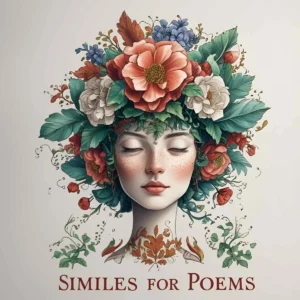Similes as a Lens for Stress 🖌️
Similes are like lanterns in a storm, casting light on complex feelings by comparing them to familiar things with “like” or “as.” They make the invisible tangible, turning a vague “I’m stressed” into “My stress is like a knotted rope, tightening with every task.” By giving stress—a universal yet personal experience—vivid imagery, similes enhance writing, deepen conversations, and spark empathy. Whether in a journal, a speech, or a chat with a friend, similes make stress relatable and expressive. Ever felt stress but struggled to describe it? Let’s explore 25 unique similes for stress, grouped by theme, to capture its weight and spark your creativity! 🌪️
Similes for Stress: 25 Vivid Comparisons
These 25 similes illuminate the many faces of stress—its weight, chaos, or quiet persistence—across personal, professional, and emotional contexts. Each includes a meaning, a contextual example, and a specific application for writing, speaking, or reflection. Let’s dive into the colorful world of stress!
Stress as a Heavy Burden ⚖️
Similes that depict stress as a physical or emotional load.
- Stress presses like a boulder, crushing the chest.
Meaning: Stress feels like an immense, immovable weight, overwhelming the body.
Example: In a diary entry, “My stress pressed like a boulder, making every breath a struggle before the exam.”
Application: Use in personal essays or therapy journals to express overwhelming pressure, e.g., “Stress, a boulder, crushed me during the deadline.” - Stress slumps like a backpack, stuffed with worries.
Meaning: Stress accumulates like heavy items in a bag, slowing you down.
Example: In a workplace story, “Her stress slumped like a backpack, packed with client emails and late reports.”
Application: Perfect for work-related blogs or a text to a coworker about burnout. - Stress coils like a spring, ready to snap.
Meaning: Stress builds tension, threatening to break under pressure.
Example: In a novel, “His stress coiled like a spring, tightening with every argument at home.”
Application: Use in fiction or a stress management workshop to describe pent-up tension. - Stress drapes like a wet blanket, smothering joy.
Meaning: Stress feels heavy and dampening, stifling positive emotions.
Example: In a poem, “Stress draped like a wet blanket, dimming her laughter at the party.”
Application: Ideal for poetry or a social media post about feeling overwhelmed. - Stress stacks like bricks, building a wall of exhaustion.
Meaning: Stress accumulates steadily, creating barriers to energy.
Example: In a motivational speech, “My stress stacked like bricks, but I learned to chip away at the wall.”
Application: Use in self-help articles or a pep talk to inspire resilience.
Stress as a Chaotic Force 🌪️
Similes that capture stress as turbulent or uncontrollable.
- Stress swirls like a tornado, upending calm.
Meaning: Stress disrupts peace with wild, spiraling energy.
Example: In a blog post, “My stress swirled like a tornado, scattering my focus during finals week.”
Application: Use in student blogs or a tweet about chaotic days, e.g., “Stress is a tornado today! 🌪️” - Stress crackles like static, buzzing in the mind.
Meaning: Stress creates a constant, irritating mental noise.
Example: In a short story, “Her stress crackled like static, drowning out her thoughts in the meeting.”
Application: Perfect for workplace narratives or a journal entry about mental clutter. - Stress surges like a river, flooding the heart.
Meaning: Stress overwhelms emotions like a river breaking its banks.
Example: In a therapy session, “My stress surged like a river, flooding me with panic before the presentation.”
Application: Use in mental health discussions or a text to a friend about anxiety. - Stress dances like wildfire, leaping from task to task.
Meaning: Stress spreads quickly, igniting new worries.
Example: In a workplace email, “Stress danced like wildfire, jumping from emails to urgent calls.”
Application: Great for professional blogs or a caption about a hectic workday. - Stress hums like a swarm, relentless and buzzing.
Meaning: Stress persists with constant, overwhelming activity, like bees.
Example: In a memoir, “Her stress hummed like a swarm, following her through every sleepless night.”
Application: Use in reflective writing or a speech about chronic stress.
Stress as a Quiet Intruder 🕸️
Similes for stress that creeps in subtly or lingers.
- Stress creeps like fog, clouding the mind.
Meaning: Stress settles gradually, obscuring clarity like fog.
Example: In a journal, “My stress crept like fog, blurring my focus during the quiet morning.”
Application: Use in mindfulness blogs or a post about subtle anxiety, e.g., “Stress fog rolling in today. 🕳️” - Stress whispers like shadows, lingering in corners.
Meaning: Stress hovers quietly, creating unease without overt chaos.
Example: In a poem, “Stress whispered like shadows, trailing her through the empty house.”
Application: Perfect for introspective poetry or a text about low-key stress. - Stress clings like ivy, wrapping around thoughts.
Meaning: Stress grips persistently, entwining mental space like ivy on walls.
Example: In a novel, “His stress clung like ivy, choking his creativity before the deadline.”
Application: Use in creative writing or a journal about persistent worries. - Stress drips like a faucet, steady and maddening.
Meaning: Stress wears you down with small, constant irritations.
Example: In a workplace story, “Her stress dripped like a faucet, each email adding to the annoyance.”
Application: Great for blogs about micro-stressors or a caption about daily frustrations. - Stress lurks like a cat, pouncing unexpectedly.
Meaning: Stress strikes suddenly, catching you off guard.
Example: In a personal essay, “My stress lurked like a cat, pouncing during the quiet commute.”
Application: Use in anxiety narratives or a tweet about sudden panic.
Stress as an Emotional Cage 🥾
Similes that frame stress as trapping or isolating.
- Stress binds like chains, shackling the spirit.
Meaning: Stress feels like a restraint, limiting freedom and joy.
Example: In a speech, “My stress bound me like chains, but I broke free with deep breaths.”
Application: Use in motivational talks or a journal about overcoming stress. - Stress traps like quicksand, pulling deeper with struggle.
Meaning: Stress worsens with resistance, like quicksand engulfs fighters.
Example: In a therapy blog, “Her stress trapped like quicksand, sinking her as she overthought.”
Application: Perfect for mental health articles or a text about feeling stuck. - Stress builds like a cage, locking out calm.
Meaning: Stress creates mental barriers, isolating you from peace.
Example: In a short story, “His stress built like a cage, barring him from sleep.”
Application: Use in fiction or a caption about feeling trapped by stress. - Stress squeezes like a vice, crushing resilience.
Meaning: Stress applies intense pressure, testing endurance.
Example: In a workplace narrative, “Stress squeezed like a vice, testing her patience with endless tasks.”
Application: Great for professional blogs or a speech about workplace pressure. - Stress knots like a rope, tangling the heart.
Meaning: Stress creates emotional tangles, complicating feelings.
Example: In a poem, “Her stress knotted like a rope, twisting her joy into worry.”
Application: Use in emotional poetry or a journal about complex feelings.
Stress with Cultural Resonance 🌍
Similes inspired by cultural or symbolic imagery.
- Stress looms like a monsoon, heavy with impending chaos.
Meaning: Stress feels like an overwhelming, inevitable storm, tied to cultural imagery of monsoons.
Example: In a travel memoir, “My stress loomed like a monsoon, threatening to flood my plans in Mumbai.”
Application: Use in cultural narratives or a post about travel stress. - Stress weaves like a tapestry, threading worries into art.
Meaning: Stress blends pressures into a complex pattern, like a cultural textile.
Example: In a family story, “Her stress wove like a tapestry, blending work and home into a tight design.”
Application: Perfect for reflective essays or a speech about balancing life. - Stress drums like a festival, pulsing with urgency.
Meaning: Stress vibrates with intense rhythm, like drums at a cultural event.
Example: In a cultural blog, “His stress drummed like a festival, racing through the project deadline.”
Application: Use in cultural writing or a caption about high-energy moments. - Stress glimmers like a mirage, promising relief that fades.
Meaning: Stress teases with false calm, like a desert mirage deceives travelers.
Example: In a novel, “Her stress glimmered like a mirage, offering rest that vanished with new tasks.”
Application: Great for fiction or a tweet about elusive relaxation. - Stress sculpts like clay, molding the soul under pressure.
Meaning: Stress shapes character through challenges, like clay in an artist’s hands.
Example: In a commencement speech, “My stress sculpted me like clay, shaping strength for the future.”
Application: Use in graduation speeches or a journal about personal growth.
Creative Examples to Spark Insight 🎨
These similes paint stress in vibrant hues. “Stress swirls like a tornado” captures the chaos of a busy week, perfect for a vlog about finals. “Stress clings like ivy” evokes quiet persistence, ideal for a reflective poem. Ever felt stress as a “vice” during a tough day? Try it in a work email for relatability. Which simile feels like your stress—does it roar like a river or creep like fog? 🕸️
Try This: Pick a simile and write a sentence about your day, like “My stress coiled like a spring during that meeting.” Share it in a journal or with a friend!
Practical Applications for Every Voice 📝
These similes can enrich your communication:
- Journals: Use “stress presses like a boulder” to vent in a diary, e.g., “Today, stress was a boulder on my chest.”
- Stories: Add “stress surges like a river” to a novel’s climax, showing a character’s panic.
- Speeches: Say “Stress traps like quicksand, but we rise together” in a team huddle to inspire.
- Social Media: Post “Stress is a tornado this week! 🌪️” to connect with followers.
- Conversations: Drop “My stress drips like a faucet” in a chat to describe daily irritations.
Challenge: Rewrite a stressful moment with a simile, like “I was tense” to “My stress knotted like a rope.” Notice how it deepens your expression!
Conclusion: Transform Stress with Similes 🌟
Similes are your palette for turning stress into art. From “boulders” crushing the chest to “tapestries” weaving worries, these comparisons make stress vivid, relatable, and even poetic. Why not play with them? Use “stress crackles like static” in your next journal or invent your own—maybe “stress is a maze, twisting my thoughts.” Share it with a friend or tweet it to spark connection. Stress may be heavy, but similes are wings—use them to soar! 🚀



